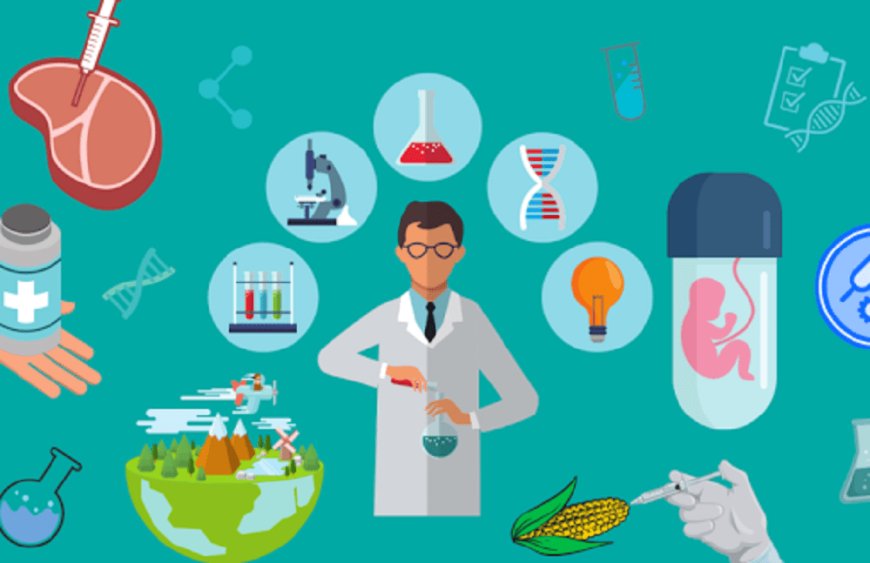What after biotechnology?
The origins of biotechnology date back several millennia before our era. Even then, people learned to use biological processes for

The origins of biotechnology date back several millennia before our era. Even then, people learned to use biological processes for useful purposes, such as the production of yoghurt, cheese and bread. Currently, biotechnology is a vast field, without which it is difficult to imagine modern agriculture, medicine and many industries. It combines theoretical issues in the field of natural sciences and technological aspects, opening the door to a career, among others, in scientific and research units, industry and diagnostic laboratories. According to the data of the Ministry of Education and Science, biotechnology is in the top fifteen most frequently chosen fields of study.
Studies in the field of biotechnology
Education in the field of biotechnology is carried out in accordance with the Bologna system. First-cycle studies may, depending on the choice of the university, last 3 years and lead to obtaining a bachelor's degree or 3.5 years and end with an engineering degree. Bachelor's studies are usually conducted by universities, while engineering studies by technical schools (including polytechnic schools). At the recruitment stage, be sure to familiarize yourself with the education model that applies to the university you are considering. After obtaining the bachelor's or engineer's degree, you can continue your studies in the second-cycle studies, which last 2 years or 1.5 years, respectively. Studies in the field of biotechnology are conducted mainly in a full-time system. Few universities offer evening studies.
The training program of future biotechnologists includes mainly natural science subjects, such as cell biology, molecular biology, genetics, biochemistry, biophysics, microbiology, physiology, basics of immunology, genetic engineering, and bioprocess engineering. Students will also learn mathematics, general chemistry, organic chemistry, statistics and computer science. Depending on the university, the study plan may be slightly different, for example, medical universities will put more emphasis on the medical aspects of biotechnology.
Within the framework of studies in biotechnology, it is usually possible to choose a specialization. Some of the paths available to students are:
- Pharmaceutical biotechnology
- Medical biotechnology
- Environmental biotechnology
- Bioinformatics
- Molecular biology
- Peptide and protein biotechnology
- Molecular microbiology
- Bioprocess engineering
- Technology, biotechnology and food analysis
- Plant biotechnology
- Industrial biotechnology
- Microbioanalysts
Work after biotechnology
Work in the biotechnology industry
The biotechnology industry is a forward-looking and dynamically developing field that has been recognized as crucial for Europe's bioeconomy. Experts from the biotechnology industry design technological processes using knowledge of natural phenomena, such as biosynthesis and biocatalysis. They deal, among other things, with the creation of biofuels, biopolymers and biodegradable materials, as well as the processing of plant raw materials for energy production.
Work in the pharmaceutical industry
A graduate of biotechnology can also find a job in the pharmaceutical industry and deal with the identification of disease-causing factors, designing new drugs, proteins, antibodies and vaccines, or the cultivation of biopharmaceuticals.
Must Read: The most common mistakes in a CV
Work in the cosmetics industry
The skills and knowledge acquired during the studies in the field of btare also useful for creating innovative cosmetics and obtaining raw materials for the production of cosmetics in an environmentally safe way. A well-known achievement of bt in this area was the acquisition of hyaluronic acid that gives the skin elasticity from the cell walls of some bacteria.
Work in the food industry
Biological processes underlie the production of many of the delicacies we know, such as cheese, yoghurt, soy sauce and various beverages. In addition to such traditional applications, biotechnology is used, for example, to produce natural food additives. Biological modifications of plants, in turn, allow for obtaining higher yields, as well as fruit and vegetables with better taste and greater durability.
Work in a diagnostic laboratory
There is also a need for bt in the area of ‹‹healthcare. People with such education can work in medical (e.g. cytogenetic) laboratories and support doctors in diagnostic and therapeutic processes.
Work in institutions dealing with environmental protection
In view of worrying climate change, natural solutions to reduce environmental pollution and the use of raw materials are at a premium. Experts in the so-called blue bt deal with the protection of waters, as well as the use of resources present in them in the industry. In addition to blue, there is also a much more developed green bt, the task of which is, among other things, to modify organisms so that they automatically clean the environment.
Thesis
Due to the enormous potential of bt. As graduates of bt, you will be able to decide on a scientific career and work on solutions that have a chance to revolutionize agriculture, industry or medicine, or contribute to the improvement of the condition of our planet.
